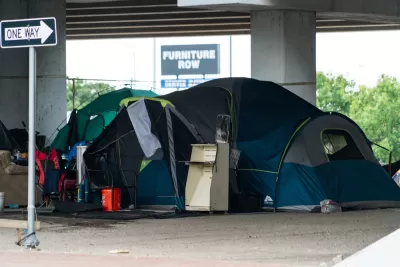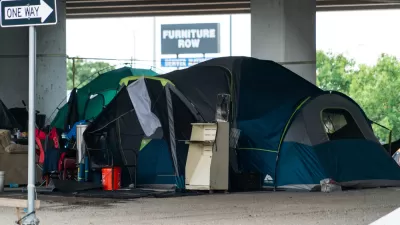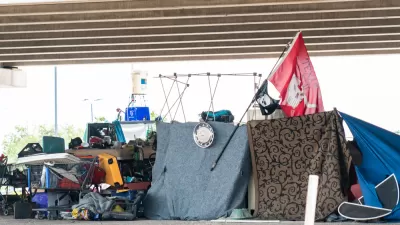Voters in Austin voted to reinstate a ban on public camping, taking steps to criminalize homelessness before the State Legislature could.

"In a hotly contested debate involving the city's homelessness crisis, 57% of voters said they were in favor of reinstating criminal penalties for camping in public spaces and 42% said they were not," reports Ryan Autollo.
The vote overturns a law approved by the City Council and Mayor Steve Adler two years ago. A law that would preempt local camping laws—written largely in response to the Austin law—had been progressing through the State Legislature.
Mayor Adler, conceding defeat in the Proposition B vote, pledged to reduce the city's homeless population before leaving office in 2023. "A plan he helped created with other government officials and nonprofit leaders calls for Austin to add 3,000 housing and shelter units in the next three years," according to Autollo.
The controversies over homelessness in the city are set in a context of rapid growth—with many newcomers arriving from California and potentially finding some of the dynamics they fled from on the West Coast already taking hold in Austin.
For example, the cost of housing, while still lower than San Francisco, is growing quickly. "According to Zillow, home prices in Austin are up more than 18% in the last year, creating a shortage of affordable housing," according to an article published by CBS News.
The comparisons to San Francisco are readily available in the CBS News coverage: "Laid-back and long known for its food and music scene, the capital of Texas has become one of the fastest-growing cities in the nation. The downtown skyline is a ballet of cranes and new skyscrapers. Tech giants like Google and Apple are expanding their footprint, and Tesla is building a massive manufacturing plant here."
For now at least, however, the Austin offers more value than San Francisco, according to the new arrivals quoted in the article, one of which reports affording the rent for a three-bedroom home in Austin For the same price as an apartment in San Francisco.
FULL STORY: Austin voters choose to bring back homeless camping ban

Study: Maui’s Plan to Convert Vacation Rentals to Long-Term Housing Could Cause Nearly $1 Billion Economic Loss
The plan would reduce visitor accommodation by 25,% resulting in 1,900 jobs lost.

North Texas Transit Leaders Tout Benefits of TOD for Growing Region
At a summit focused on transit-oriented development, policymakers discussed how North Texas’ expanded light rail system can serve as a tool for economic growth.

Why Should We Subsidize Public Transportation?
Many public transit agencies face financial stress due to rising costs, declining fare revenue, and declining subsidies. Transit advocates must provide a strong business case for increasing public transit funding.

How to Make US Trains Faster
Changes to boarding platforms and a switch to electric trains could improve U.S. passenger rail service without the added cost of high-speed rail.

Columbia’s Revitalized ‘Loop’ Is a Hub for Local Entrepreneurs
A focus on small businesses is helping a commercial corridor in Columbia, Missouri thrive.

Invasive Insect Threatens Minnesota’s Ash Forests
The Emerald Ash Borer is a rapidly spreading invasive pest threatening Minnesota’s ash trees, and homeowners are encouraged to plant diverse replacement species, avoid moving ash firewood, and monitor for signs of infestation.
Urban Design for Planners 1: Software Tools
This six-course series explores essential urban design concepts using open source software and equips planners with the tools they need to participate fully in the urban design process.
Planning for Universal Design
Learn the tools for implementing Universal Design in planning regulations.
City of Santa Clarita
Ascent Environmental
Institute for Housing and Urban Development Studies (IHS)
City of Grandview
Harvard GSD Executive Education
Toledo-Lucas County Plan Commissions
Salt Lake City
NYU Wagner Graduate School of Public Service





























